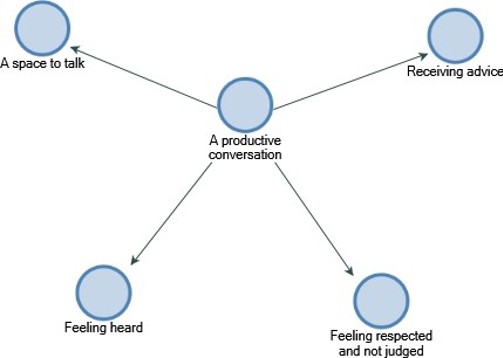Background
We recently conducted a 1-year evaluation of the Advantage Mentoring Programme. Advantage is a new mentoring programme for young people aged 14-21 years from underserved communities, with mild to moderate mental health and wellbeing difficulties. The programme focuses on helping to re-establish aspirations and a sense of connection for young people. Participants receive ongoing individual mentoring support for up to 6 months from trained professional football Clubs’ Community Organisation (CCO) youth workers, who are in turn supported by an NHS CAMHS practitioner via supervision.
Administrative data including mental health and wellbeing outcome information was collected at the beginning (Time 1) and when young people had completed the programme (Time 2). Outcome measures included the Outcome Rating Scale, the Perceived Stress Scale, the World Health Organisation - Five Well-Being Index, and the Goal Based Outcomes tool. We also conducted interviews with both mentors and mentees, about their experiences of the programme, and the young people’s wellbeing outcomes.
Outcomes and impact
We received administrative data for all 48 young people engaged in Advantage between October 2021 and September 2022, from London and Manchester. The young people were on average 16 years old, and the majority were male (67%). The most common ethnic category was Black/Black British (29%) and there was a majority (75%) of participants from minoritized ethnic backgrounds, which is noticeably different from CAMHS referrals of which less than 25% are from minoritized ethnic backgrounds. Young people involved in Advantage were, on the whole, from areas with high levels of multiple deprivation, in terms of, for example, income, employment, health and crime.
We found that mentees reported statistically significant improvements on all four of the outcome measures focused on general wellbeing, stress and goals.
In interviews, mentees described Advantage as a setting for conversations with a focus on providing practical solutions, working together towards goals, and giving young people space to talk. They discussed receiving advice from mentors who they get on well with, and who some saw as role models. Shared interests, feeling listened to, and the trusting and non-judgemental nature of the mentor-mentee relationship were important factors from the mentees’ perspectives.
Mentors described Advantage as flexible, with the format and content of the sessions varying depending on the needs of the mentees. Mentors described their sense that the Advantage Programme had a positive impact on young people and also suggested some areas for improvement.

[image: young people's description of the sessions]
In summary
We found that overall, young people involved in Advantage reported a positive impact on their mental wellbeing and consistent with its aims, Advantage is providing support in an early intervention capacity. Advantage’s location in the community also makes it more accessible to young people from minoritized ethnic groups to engage with compared to other sources of support.
The full evaluation report can be found here.
You can visit the Advantage Mentoring Website here.
The Child Outcomes Research Consortium (CORC) at the Anna Freud National Centre for Children and Families (AFNCCF) were commissioned by the Advantage Programme Partnership to conduct an independent evaluation of the Advantage Programme. The evaluation ran from October 2021 to September 2022.